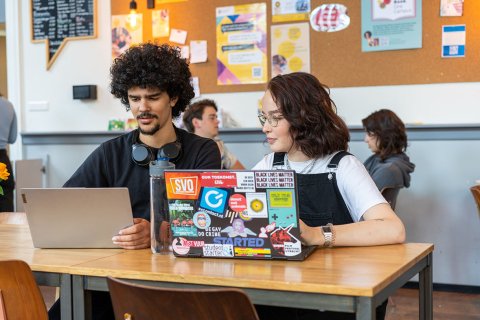Study programme
The Master's programme comprises one year (60 EC) and consists of two semesters, running from September until January and from February until June. A semester is divided into two study periods.
Curriculum
The programme consists of compulsory courses, electives, an internship and a Master's thesis. Check the study schedule (PDF).
Semester 1 | Study period 1
- You will get an up-to-date view on theatre and dance theory.
- You will explore the performative, social and material turn in contemporary performance, and learn how a dramaturge is able to create those connections.
- In addition, you will train academic skills in a Research Lab course.
Semester 1 | Study period 2
- You will choose two electives, and continue the Research Lab.
- You can choose courses of our Master’s programme, like Expanding Performance, where we explore relations between theatre studies and other fields of research, such as science or law.
- In our other elective course, you will learn how to provide artistic feedback, how to create a dramaturgical context for theatre and dance, and explore relations between dramaturgy and curating. You can also choose selective courses of related Master’s programmes.
Semester 2 | Study period 3 and 4
The second semester comprises the Master’s thesis and a research internship. Here you can specialise in your own subject, like intermedial performance installations, music theatre, youth theatre or urban dance.
Part-time
It is possible to do a part-time trajectory (PDF), which involves a distribution of the full-time programme over 2 years.

Educational methods
- seminar (40%)
- group work (5%)
- self-study (25%)
- tutorials (5%)
- practical research or internship (25%)
The seminars are a combination of discussion and lectures, in which different study methods are used. The meetings will sometimes have the feel of a lecture, whereas at other times, there will be group discussions, practical assignments, feedback exercises, visits to performances and festivals, or field-oriented activities.
Internship
This programme combines theatre and dance studies with theatre and dance dramaturgy. You choose your own area of specialisation and will orientate yourself actively in the work field or research area of your interest, by completing an internship or by participating in our staff’s research projects.
In recent years, our students have completed internships at, for example, Dansateliers, Kaaitheater, International Theatre Amsterdam, Spring Performing Arts Festival, ICAF Community Arts Festival, or participated in our staff’s research projects, such as Performance Studies International, The City as Stage and Platform-Scenography.
Read more
Internship Labs
During one of our Internship Labs, in the first semester, we offer as a first orientation on the internships in the second semester, by presenting a number of internship requests we receive from our broad network. The internship is an important means to start up or enlarge your network. Many of our students end up with jobs as a follow-up on that internship. You are appointed a supervisor who advises on how to orientate in the field and how to contact an internship provider. These preparations also train the necessary skills to apply for a job after graduation.
Please keep in mind that most organisations in the Netherlands use Dutch as their working language, so it requires some stamina and creativity to arrange an internship. Students are responsible for finding an internship, however, the staff actively uses their professional network to support this. You can also engage in a research project by one of our staff members, at an international organisation or do an internship abroad.
Internship at Noord Nederlands Toneel
Student Iro Vasalou, who has a background in dance and choreografie, did an internship at Noord Nederlands Toneel, working alongside dramaturg Robbert van Heuven.
Internship at DG Theaterproducties
Student Vera Slager did her internship at DG Theaterproducties (in Dutch) in Utrecht. She worked mainly as a production assistant, on the production of Bridges of Madison County, but she has also been company manager.
Examinations
- papers and portfolios
- internship evaluation and internship report
- thesis
All courses in the first semester are examined through written papers or portfolios, some of which are connected to practical exercises and assignments. Dependent on the specific course this involves, those will involve either one or two larger papers within the course or a series of smaller written assignments.
The type of assignment may differ depending on the course content—themes in these courses may have alternating focuses, such as working with theoretical concepts, dramaturgical reports, and art criticism.
Extra opportunities
For students looking for an extra challenge in addition to their Master's, there are several options. Utrecht University offers several honours programmes for students looking for an extra challenge. Honours education is followed on top of your regular Master's programme and goes beyond the regular curriculum. Honours programmes are available at interdisciplinary level and allow you to work on projects that transcend your own discipline.

